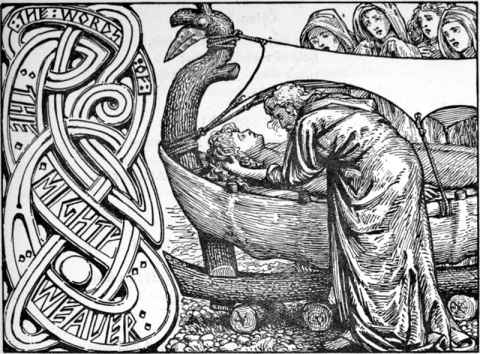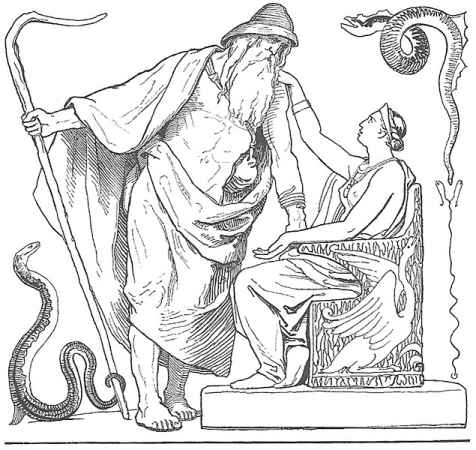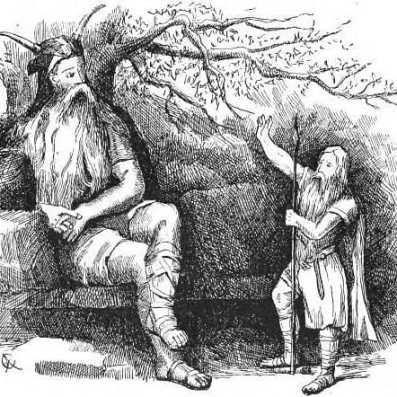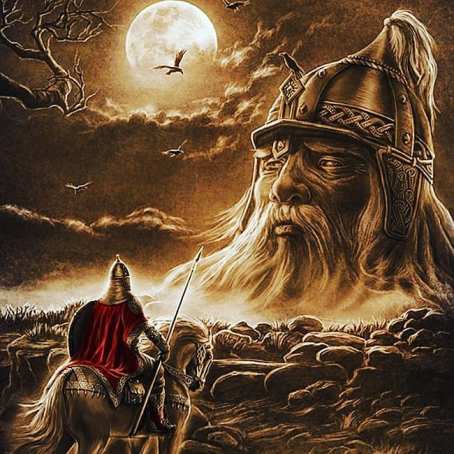Vafthruthnismol (Vafþrúðnismál) is the third poem in the Poetic Edda as seen in the Codex Regius. It follows the Hávamál (Words of the High One) and precedes the Grimnismal which is similar to it in style. Snorri Sturluson quotes several parts of the poem in his Prose Edda, drawing on it for facts.
A battle of wits
The poem is mostly a dialogue between Odin and the Jötun Vafthrudnir (Old Norse Vafþrúðnir), presumably the wisest of all the giants.
The Jötun challenges Odin to a battle of wits, not knowing who Odin, who is traveling by the name Gangrath really is. What ensues is a long number of challenges or riddles, and answers which provide a wealth of insight into the Norse myths.
Odin, always seeking out wisdom and known to travel far and wide to find it, sought out Vafthrudnir for that exact purpose. While greeting the mystery guest well, Odin is quickly challenged by the wise old Jötun, even threatening his life if he should not prove more knowledgeable.

Without wanting to spoil the entertaining poem, Odin does strike the final blow when challenging the wise old Jötun to tell him what Odin (himself) whispered in Balders’ ear on his funeral pyre. At this Vafthrudnir concedes defeat, finally understanding that Gagnrath is really Odin.
Grimnismal and Vafthrudnismal seen together
The poem following Vafthrudnismal in the Poetic Edda is the Grimnismal. It is very similar in style and also provides an encyclopedia-like listing of facts from Norse Mythology. The two poems together, along with the Völuspá gives the reader a great wealth of insight. As they are covering the creation, stories and eventual destruction of the nine realms and the gods themselves.
Two other poems from the Poetic Edda that shares the style somewhat is the Alvísmál and Lokasenna. In the Alvísmál Thor engages in a long series of challenging questions to the dwarv Alvis who then names synonyms for different things across the worlds. While little of mythological value, it is a source for a number of variations in the name of phenomenas.
In the Lokasenna on the other hand, we are given an insight into a whole host of different mythological references. However, many of the references are made to stories or events we otherwise know little of. Highlighting how many of the old stories we have in fact lost through the ages.
The origins of the Poetic Edda, or that of the separate poems it is made up of is a mystery. However, these two lays and the Hávamál are believed to have been written sometime in the middle nine-hundreds.
Style and structure of this adaptation
The Poetic Edda, where the Vafthrudnismal poem is from, is not one book, but rather a collection of poems. This collection has survived through the centuries in several books, with slight variations. Along with the Prose Edda by Snorri Sturluson, it has later been translated many times and there are different variants available in English.
While they are all based on the same source material, they have variations. One of the things that have proven difficult is following the original meter or the structure of the verses in the poems. There are several meters known as Eddaic or Skaldic meters and while they work in the Old Norse it was originally written, but it doesn’t always translate as well.
The following version of the Vafthrudnismal is an adaptation of an older English translation. It is slightly modernized so as to not lose meaning unnecessarily. Where the meaning wasn’t quite clear or seemed overly stilted, a modern Norwegian translation has been consulted.
Vafþrúðnismál

Odin spoke:
1, “Counsel me, Frigga, for I long to travel,
To find Vafthruthnir;
In matters of ancient times
Would I like to contend with the wise giant.”
Frigg spoke:
2. “All-father here at home would I keep,
Where the gods dwell together;
Among all the giants I know no equal
To Vafthruthnirs’ mighte.”
Odin spoke:
3. “I have traveled much | I have seen much.
Much have I got from the gods;
I would like to know, the company
One can find in Vafthruthnirs’ hall.”
Frigg spoke:
4. “Travel safe, come back safe again,
And safe be the way you travel!
Father of men, let your mind be sharp
When speaking with the giant.”
5. The knowledge of the wise giant
Did he travel to challenge;
He saw the hall | of the father of Im,
And Ygg went in.
Odin (as Gagnrath) arrives at the hall of Vafthruthnir
Odin spoke:
6. “Vafthruthnir, hello! | to your hall have I come,
I came hoping to meet you;
The first I would ask is | whether you are wise,
Or you are a very wise, old giant.”
Vafthruthnir spoke:
7. “Who is the man | that speaks to me,
Here in my lofty hall?
Away from our dwelling | you will never travel,
Unless you are wiser than I.”
Odin spoke:
8. “Gagnrath they call me, | and I come thirsty
From a hard journey to your hall;
I seek hospitality, | for I have traveled far,
And a gentle greeting, giant.”
Vafthruthnir spoke:
9. “Why are you standing there | on the floor while you speak?
You shall have a seat in my hall;
Then we will soon know | who is more knowledgeable,
The guest or the old sage.”
Odin spoke:
10. “If a poor man reaches | the home of the rich,
Let him speak wisely or be still;
For he who speaks | with the hard of hearing
Chatter will never work well.”
Vafthruthnir has five questions for Gagnrath/Odin
Vafthruthnir spoke:
11. “Tell me now, Gagnrath, | there on the floor
If you want your wisdom be known:
What name has the horse | that each morning anew
Dagr for mankind draws?”
Odin spoke:
12. “Skinfaxi is he, | the horse that for men
The glittering Dagr draws;
The best of horses | he is seen to be,
And brightly his mane burns.”
Vafthruthnir spoke:
13. “Tell me now, Gagnrath, | there on the floor
If you want your wisdom be know:
What name has the horse | that from the East
Brings Nott for the noble gods?”
Odin spoke:
14. “Hrimfaxi is his name | the horse that
Brings Nott for the noble gods;
Each morning foam | falls from his bit,
And from there comes the dew in the valleys.”
Vafthruthnir spoke:
15. “Tell me now, Gagnrath, | there on the floor
If you want your wisdom be know:
What name has the river | that divides the realms
Of the gods and the giants?”
Odin spoke:
16. “Ifing is the river | that divides the realms
Of the gods and the giants;
For all of time | it flows open,
No ice on the river there is.”
Vafthruthnir spoke:
17. “Tell me now, Gagnrath, | there on the floor
If you want your wisdom be know:
What name has the field | where in battle will meet
Surt and the gracious gods?”
Odin spoke:
18. “Vigrid is the field | where in battle will meet
Surt and the gracious gods;
A hundred miles | each way does it measure.
And so are its boundaries set.”
Vafthruthnir spoke:
19. “You are wise, guest! | Come sit at my bench,
In our seats let us speak together;
Here in the hall | our heads, dear guest,
Shall we wager our wisdom upon.”
Odin has twelve questions for Vafthruthnir

Odin spoke:
20. “First answer me well, if you are indeed wise ,
And you know it, Vafthruthnir:
In ancient times | where did the earth come from,
Or the sky, you wise giant?”
Vafthruthnir spoke:
21. “Out of Ymir’s flesh | was the earth created,
And the mountains were made of his bones;
The sky from the frost-cold | giant’s skull,
And the ocean out of his blood.”
Odin spoke:
22. “Next answer me well, if you are indeed wise,
And you know it, Vafthruthnir:
Where did Mani come from, | that travels
over the realm of men, and the flaming Sol?”
Vafthruthnir spoke:
23. “Mundilfari is he | who fathered Mani,
And the flaming Sol;
Across the sky | each day they run,
To tell the time for men.”
Odin spoke:
24. “Third answer me well, | if you are to be called wise,
And you know it, Vafthruthnir:
Where did Dagr come from, | that travels over men,
Or Nott with the narrowing moon?”
Vafthruthnir spoke:
25. “The father of Dagr | is called Delling ,
And Not was born by Nor;
Full moon and new | were created by the gods,
To tell the time for men.”
Odin spoke:
26. “Fourth answer me well, | if you are to be called wise,
And you know it, Vafthruthnir:
From where did Vetr, | or the warm Sumarr,
First come to the gracious gods?”
Vafthruthnir spoke:
27. “Vindsval was he | who was Vetr’s father,
And Svosuth is father to Sumarr ;
Both of them shall forever be,
Until the gods meet their end.”
Odin spoke:
28. “Fifth answer me well, | if you are to be called wise,
And you know it, Vafthruthnir:
What giant was the first | born in ancient times,
And is the eldest of Ymir’s kin?”
Vafthruthnir spoke:
29. “Uncountable Winters | since earth was made
Was the birth of Bergelmir;
Son of Thruthgelmir’s | was the strong giant,
And Ymir’s grandson of old.”
Odin spoke:
30. “Sixth answer me well, | if you are to be called wise,
And you know it, Vafthruthnir:
Where did Ymir come from | and the race of giants,
So long ago, you wise giant?”
Vafthruthnir spoke:
31. “Down from Élivágar | did venom drop,
Out of it formed till a giant it was;
And thence arose | our giants’ race,
And thus fierce are we seen.”
Odin spoke:
32. “Seventh answer me well, | if you are to be called wise,
And you know it, Vafthruthnir:
How did he father children, | the grim giant,
Who never knew a giantess?”
Vafthruthnir spoke:
33. “They say under the arms | of the ice-giant
Grew a man and woman together;
And with his feet | did the wise one create
A son that bore six heads.”
Odin spoke:
34. “Eighth answer me well, | if you are to be called wise,
And you know it, Vafthruthnir:
How far back | do you remember?
For deep is your wisdom, giant!”
Vafthruthnir spoke:
35. “Uncountable Winters | before the earth was made
Was the birth of Bergelmir;
This first I remember well, | when the wise giant
In a boat of old was born.”
Odin spoke:
36. “Ninth answer me well, | if you are to be called wise
And you know it, Vafthruthnir:
Where does the wind come from | that travels over the waves
Yet never itself is seen?”
Vafthruthnir spoke:
37. “Disguised as an eagle | at the end of heaven
Sits the Jötun Hræsvelgr, they say;
And from his wings | does the wind come
To move over the world of men.”
Odin spoke:
38. “Tenth answer me now, | if you are all knowing
The fate that is set for the gods:
Where did Njord come from | to the race of the Aesir,
(Rich in temples | and shrines he rules,–)
Yet he was not born of the Aesir?”
Vafthruthnir spoke:
39. “In the home of the Vanir | did the wise ones create him,
And gave him as pledge to the Aesir;
At the end of the world | he will travel once more
Home to the wise Vanir.”
Odin spoke:
40. “Eleventh answer me now, l if you are all knowing
The fate that is set for the gods:
What men are they who in Odin’s home
Each day goes into battle?”
Vafthruthnir spoke:
41. “The Einherjar all | in Odin’s hall
Each day goes into battle;
They kill each other, | yet travel from battle
All fully healed soon to sit together.”
Odin spoke:
42. “Twelfth answer me now | about all you know
About the fate that is set for the gods;
About the runes of the gods | and the giants’ race
You do indeed tell the truth,
(And deep is your wisdom, giant!)”
Vafthruthnir spoke:
43. “About the runes of the gods | and the giants’ race
I can indeed tell the truth,
(For I have been to every world;)
To all nine worlds have I been, | to Niflhel beneath,
The home where dead men dwell.”
Questions about the fate of the gods

Odin spoke:
44. “I have traveled much | I have seen much,
Much have I got of the gods:
Who will survive of mankind | when at last there comes
The mighty winter to men?”
Vafthruthnir spoke:
45. “In Hoddmimir’s wood | shall they hide
Lif and Lifthrasir then;
The morning dews | will provide food for them,
Such food shall men then find.”
Odin spoke:
46. “I have traveled much | I have seen much,
Much have I got of the gods:
From where does the sun | come back to the sky,
After Fenrir has snatched this one?”
Vafthruthnir spoke:
47. “A bright daughter | Alfrothul will bear
Before Fenrir will snatch her;
In her mother’s paths | will the maiden follow
When the gods to death have gone.”
Odin spoke:
48. “I have traveled much | I have seen much,
Much have I got of the gods:
Who are those maidens, | so wise of mind.
That travel together, over the sea?”
Vafthruthnir spoke:
49. “Over Mogthrasirs’ hill | will the maidens go,
Three are they, the descendants of Mogthrasir;
They will protect | the dwellers on earth,
Even though they come from the giants’ race.”
Odin spoke:
50. “I have traveled much | I have seen much,
Much have I got of the gods:
Who then willl rule | the realm of the gods,
After the fires of Surt have resided?”
Vafthruthnir spoke:
51. “In the gods’ home Vidar | and Vali shall live,
When the fires of Surt have resided;
Modi and Magni | will have Mjollnir
After Thor falls in battle.”
Odin spoke:
52. “I have traveled much | I have seen much,
Much have I got of the gods:
What will bring the doom | of death to Odin,
When the gods meet their end?”
Vafthruthnir spoke:
53. “The wolf will kill | the father of men,
And this willl Vidar avenge;
The terrible jaws | shall he tear apart,
And so will he slay the wolf.”
Odin spoke:
54. “I have traveled much | I have seen much,
Much have I got from the gods:
What did Odin speak | into the ears of his son,
Before he burned in the funeral pyre?”
Vafthruthnir spoke:
55. “No man can tell | what in ancient times
You spoke in the ear of your son;
With fated mouth | the ancient tales
Of the fall of the gods have I told;
With Odin in knowledge | have I competed,
And you are ever wiser.”
Featured Image Credit: Lorenz Frølich, Public domain, via Wikimedia Commons
